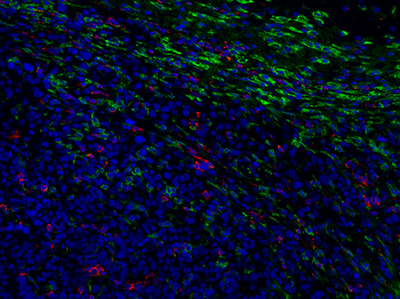Targeting the Immunosuppressive Tumor Microenvironment with Transform Switch Receptors (TSR)

Adoptive cell therapy (ACT) is an exciting therapeutic strategy that uses genetically-engineered immune cells to target and destroy tumors. The tumor microenvironment (TME) features obstacles that block T cells from eradicating tumor, such as the expression of inhibitory ligands, lack of positive signals, and tumor cells that compete with T cells for nutrients.
To “armor” T cells against these inhibitory hurdles, we innovate fusion proteins that combine a membrane-bound protein ectodomain with a costimulatory signaling endodomain. These novel proteins are expressed in genetically engineered T cells, for use in cell therapy. Our Transform Switch Receptors (TSRs) incorporate the ectodomain of a negative receptor that would normally shut down the T cell, with an intracellular costimulatory domain that provides a positive signal; thus, converting a negative signal to a positive signal. This approach combines a decoy receptor with a costimulatory signaling domain, to “replace a brake with an accelerator”.
We are developing a toolbox of TSRs and will determine which ones best enhance therapeutic efficacy against hematological and solid tumors, to support clinical translation.
